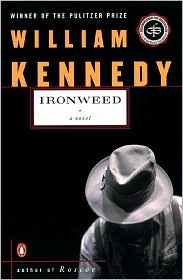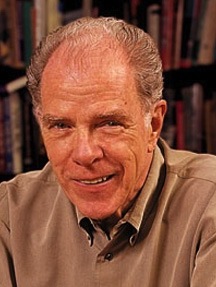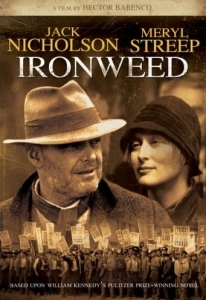Note: This novel was WINNER of the Pulitzer Prize and National Book Critics Circle Award in 1984. The author was also WINNER of the 2009 O’Neill Award for Lifetime Achievement.
“My guilt is all I have left. If I lose it, I have stood for nothing, done nothing.”
 With Ironweed, William Kennedy completes his three novels of Depression-era Albany, wrapping up this study of time, place, and people with an emotionally gripping Pulitzer Prize-winner (1984) that focuses on those who call themselves “bums,” all of them living apart from society because their dreams have died. Francis Phelan, long-absent father of Billy Phelan, the main character in the previous novel, Billy Phelan’s Greatest Game, returns to Albany for the first time in twenty-two years. In the previous novel, which concludes a week before Ironweed begins, Francis reconnects with his son Billy, who, stunned by Francis’s reappearance, gets him out of jail, gives him money, and begs him to visit his mother and the family.
With Ironweed, William Kennedy completes his three novels of Depression-era Albany, wrapping up this study of time, place, and people with an emotionally gripping Pulitzer Prize-winner (1984) that focuses on those who call themselves “bums,” all of them living apart from society because their dreams have died. Francis Phelan, long-absent father of Billy Phelan, the main character in the previous novel, Billy Phelan’s Greatest Game, returns to Albany for the first time in twenty-two years. In the previous novel, which concludes a week before Ironweed begins, Francis reconnects with his son Billy, who, stunned by Francis’s reappearance, gets him out of jail, gives him money, and begs him to visit his mother and the family.
Francis, a former pro ballplayer, lost his career when he lost part of a finger in a fight. He abandoned his wife Annie and his family when he accidentally dropped and killed his 13-day-old son Gerald, an a ct for which he still atones. Francis, however, now discovers from Billy that Annie has never revealed to anyone how Gerald died, a proof of forgiveness that Francis finds astounding.
ct for which he still atones. Francis, however, now discovers from Billy that Annie has never revealed to anyone how Gerald died, a proof of forgiveness that Francis finds astounding.
For the past nine years Francis has been living on the road with another down-and-outer, Helen Archer, who managed one year at Vassar studying classical piano before her father died and her life fell apart. Smart and perceptive about people, Helen, like Francis, has tried unsuccessfully to find solace in the bottle, and now, suffering from a tumor and the effects of alcoholism, she tries to make peace with herself and her life. Both Francis and Helen understand that they have chosen their lives, and they cast no blame on others or on fate. Their many acquaintances all have similar stories, and as these stories interweave and overlap, Kennedy endows them with a tenderness of feeling and, sometimes, with an overwhelming violence, which stun the involved reader with their power.
As Francis relives even ts in his life, his inner world takes shape. The opening scene, a trip to the cemetery, where Francis visits his parents’ graves and that of baby Gerald for the first time, is one of the most dramatic openings ever written, and as Francis converses with his lost family, he establishes the contrasts with his present life. Scenes in which Francis, cursed with a hair-trigger temper, literally fights to the death alternate with scenes involving Annie and his family; scenes of his childhood and adolescence alternate with sad scenes involving the deaths of his homeless friends.
ts in his life, his inner world takes shape. The opening scene, a trip to the cemetery, where Francis visits his parents’ graves and that of baby Gerald for the first time, is one of the most dramatic openings ever written, and as Francis converses with his lost family, he establishes the contrasts with his present life. Scenes in which Francis, cursed with a hair-trigger temper, literally fights to the death alternate with scenes involving Annie and his family; scenes of his childhood and adolescence alternate with sad scenes involving the deaths of his homeless friends.

A book so good it will leave you reeling, Ironweed tears at the heart without showing a trace of sentimentality, depicting hard lives lived by down-and-out people, most of whom still possess the redeeming virtues of the more saintly who live “normal” lives. Hard-edged, sometimes violent, and even cruel, it also reveals human kindness, sweetness, and love. Kennedy’s naturalistic style and ability to create realistic dialogue give life to the stories of these characters and leave the reader with new insights into the nature of family ties, the choices we make, the forgiveness sometimes offered by others, and the nature of redemption if we choose to accept it. (On my list of All-time Favorites.)
Credits: The author’s photo appears on the site of the Irish American Writers and Artists Organization: http://www.i-am-wa.org/william_kennedy.html
In the stunning opening scene, Francis visits Albany Rural Cemetery, pictured here: http://commons.wikimedia.org
The book was made into a film starring Jack Nicholson and Meryl Streep in 1987. http://www.bellaonline.com/articles/art61149.asp
Also by William Kennedy: LEGS and BILLY PHELAN’S GREATEST GAME (These links will go to my Amazon reviews of these earlier novels.) The three books have been combined by Penguin into a single volume, An Albany Trio:
